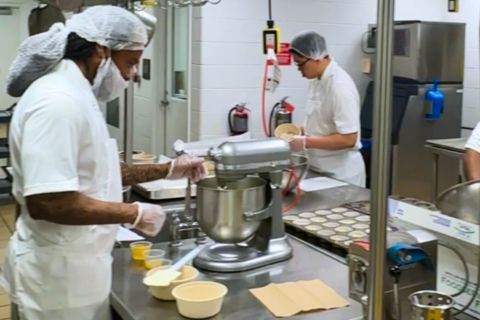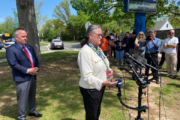In the late 1960s a group of Montgomery County, Maryland, judges and council members were part of a work group with a goal of professionalizing corrections. That led to the creation of the department of corrections and rehabilitation in 1972.
More than 50 years after the program was conceived, Ben Stevenson, Montgomery County’s director of correction and rehabilitation, reflects on its impact in honor of “Second Chance Month” — which spotlights the barriers those with a criminal record face.
“They developed the Pre-Release Center that we are at today,” Stevenson said. “It was based on providing inmates with more preparation prior to release so they don’t come back.”
Roughly 20,000 people have come through the Pre-Release Center in Rockville since its opening in 1972.
Over the years, it’s grown into four housing units with three units for men and one for women.
Ivan Downing, division chief of community corrections with the county, told WTOP that unlike the jail, the Pre-Release Center does not have iron bars.
“The living area looks like a college dorm,” Downing said. “Each room has a bunk bed and there’s two lockers, and there’s a bath shared between two bedrooms.”
When the inmates move into the Pre-Release Center, they are now known as residents, and the jumpsuits are changed to normal clothes.
Along with the freedom of walking around the complex and going outside, the resident supervisors, who are certified to the state as corrections officers, have been trained to help the residents become accustomed to returning to life outside of bars.
‘Starting A New Life’
“Our goal is to help them find jobs, gainful employment,” Downing said. “Make sure they have housing upon release.”
A lot of the inmates time will focus on working on themselves, from building resumes to getting help for any substance abuse issues they may have with treatment through programs such as Alcoholics Anonymous or narcotics anonymous.
A statue outside the Pre-Release Center depicts a man giving a woman a kiss titled, “Starting A New Life.” It’s reminiscent of another part of the center’s program: rebuilding inmates’ relationships with their families.
“Their families can stop, grab a pizza, grab a bucket of chicken or something, bring it in, sit down in the cafeteria and actually have a meal with their loved ones,” Downing said.
During a tour, Stevenson along with Downing spoke, smiled and joked with the residents.
“This program is what I would consider a beacon of light for those that want to make those changes and want to accept those responsibility and earn more freedom by doing so,” Stevenson said.
Get breaking news and daily headlines delivered to your email inbox by signing up here.
© 2025 WTOP. All Rights Reserved. This website is not intended for users located within the European Economic Area.





